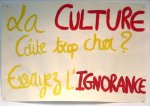Accueil > Revue de presse > À l’étranger > Poet-Bashing Police - par Robert Hass, The New York Times Sunday Review, 19 (...)
 Poet-Bashing Police - par Robert Hass, The New York Times Sunday Review, 19 novembre 2011
Poet-Bashing Police - par Robert Hass, The New York Times Sunday Review, 19 novembre 2011
lundi 21 novembre 2011, par
Robert Hass is a professor of poetry and poetics at the University of California, Berkeley, and former poet laureate of the United States.
LIFE, I found myself thinking as a line of Alameda County deputy sheriffs in Darth Vader riot gear formed a cordon in front of me on a recent night on the campus of the University of California, Berkeley, is full of strange contingencies. The deputy sheriffs, all white men, except for one young woman, perhaps Filipino, who was trying to look severe but looked terrified, had black truncheons in their gloved hands that reporters later called batons and that were known, in the movies of my childhood, as billy clubs.
The first contingency that came to mind was the quick spread of the Occupy movement. The idea of occupying public space was so appealing that people in almost every large city in the country had begun to stake them out, including students at Berkeley, who, on that November night, occupied the public space in front of Sproul Hall, a gray granite Beaux-Arts edifice that houses the registrar’s offices and, in the basement, the campus police department.
It is also the place where students almost 50 years ago touched off the Free Speech Movement, which transformed the life of American universities by guaranteeing students freedom of speech and self-governance. The steps are named for Mario Savio, the eloquent undergraduate student who was the symbolic face of the movement. There is even a Free Speech Movement Cafe on campus where some of Mr. Savio’s words are prominently displayed : “There is a time ... when the operation of the machine becomes so odious, makes you so sick at heart, that you can’t take part. You can’t even passively take part.”
Earlier that day a colleague had written to say that the campus police had moved in to take down the Occupy tents and that students had been “beaten viciously.” I didn’t believe it. In broad daylight ? And without provocation ? So when we heard that the police had returned, my wife, Brenda Hillman, and I hurried to the campus. I wanted to see what was going to happen and how the police behaved, and how the students behaved. If there was trouble, we wanted to be there to do what we could to protect the students.
Once the cordon formed, the deputy sheriffs pointed their truncheons toward the crowd. It looked like the oldest of military maneuvers, a phalanx out of the Trojan War, but with billy clubs instead of spears. The students were wearing scarves for the first time that year, their cheeks rosy with the first bite of real cold after the long Californian Indian summer. The billy clubs were about the size of a boy’s Little League baseball bat. My wife was speaking to the young deputies about the importance of nonviolence and explaining why they should be at home reading to their children, when one of the deputies reached out, shoved my wife in the chest and knocked her down.
Another of the contingencies that came to my mind was a moment 30 years ago when Ronald Reagan’s administration made it a priority to see to it that people like themselves, the talented, hardworking people who ran the country, got to keep the money they earned. Roosevelt’s New Deal had to be undealt once and for all. A few years earlier, California voters had passed an amendment freezing the property taxes that finance public education and installing a rule that required a two-thirds majority in both houses of the Legislature to raise tax revenues. My father-in-law said to me at the time, “It’s going to take them 50 years to really see the damage they’ve done.” But it took far fewer than 50 years.
My wife bounced nimbly to her feet. I tripped and almost fell over her trying to help her up, and at that moment the deputies in the cordon surged forward and, using their clubs as battering rams, began to hammer at the bodies of the line of students. It was stunning to see. They swung hard into their chests and bellies. Particularly shocking to me — it must be a generational reaction — was that they assaulted both the young men and the young women with the same indiscriminate force. If the students turned away, they pounded their ribs. If they turned further away to escape, they hit them on their spines.
Pour lire la suite.


